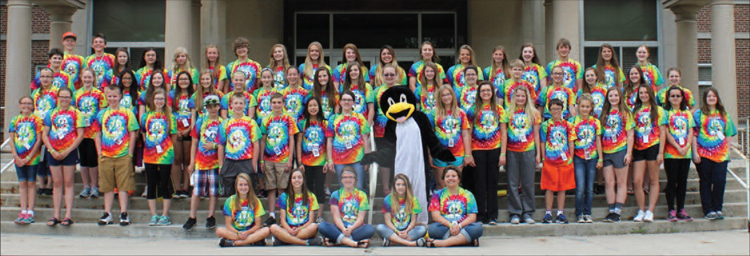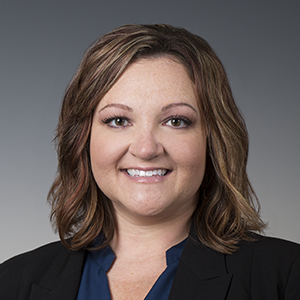Scrubs Academy Prescribes Health Career Experiences to Students
Academy helps students explore, learn about, and develop an interest in healthcare careers.
By Nikki Massmann on
 Summer can be a quieter
time on college campuses, but for one week each June, the
University of North Dakota School of Medicine & Health
Sciences is bustling with student activity.
Summer can be a quieter
time on college campuses, but for one week each June, the
University of North Dakota School of Medicine & Health
Sciences is bustling with student activity.
Since 2011, the Center for Rural Health has facilitated the Rural Collaborative Opportunities for Occupational Learning in Health (R-COOL-Health) Scrubs Academy each summer. As part of the state's healthcare workforce activities, the Academy exposes North Dakota middle school students to a variety of health professions using interactive, hands-on learning experiences. The sixth-, seventh-, and eighth-graders stay on campus during the four-day Academy. Over the five years since the initial Academy, 251 students have attended, 185 of whom have been from rural communities.
There is a shortage of healthcare professionals, especially in rural areas. The Academy provides a way to grow students' interest in health careers and help set them on the academic path they need to achieve their goals in pursuit of their career choice. The Academy emphasizes career opportunities in rural settings within the state, and students are exposed to many healthcare professions, including dentistry, physical therapy, occupational therapy, pharmacy, veterinary medicine, emergency medical services, family medicine, chiropractic care, music therapy, health information technology, and more.
"The Scrubs Academy is important to North Dakota's workforce issues from a pipeline standpoint," said Joshua Wynne, MD, MBA, MPH, UND vice president for Health Affairs and dean of the UND School of Medicine & Health Sciences.
"The School is in the middle of the pipeline, the job market is at the end, but we need to get kids, especially from rural areas, in the front door. We hope to interest them in healthcare careers by making the Academy a fun, hands-on experience. I know I enjoy participating along with them."
Lynette Dickson, associate director at the Center for Rural Health, emphasizes that the Scrubs Academy shows students that they can find a career path to suit their own interests. She said, "Career choices in health professions aren't limited to the obvious ones such as a nurse or doctor. Choices are vast, and the need for health workforce is great throughout the country—not just in North Dakota."
Each year, health professionals graciously volunteer their time to provide hands-on experiences to the Scrubs attendees. They answer questions about everything from how many years of school or specialized training are needed for their career field to what it's like to work in a rural setting. The estimated value of in-kind contributions from volunteers each year is around $16,272, based on average salaries per hour for the volunteers' professions. Remaining costs for the Academy are supported by state appropriated funding designated for Workforce Development, the Center for Rural Health's federal State Office of Rural Health grant, the Area Health Education (AHEC) grant, and registration fees from attendees.
"Volunteers help us keep registration costs down," said Kylie Nissen, senior project coordinator at the Center for Rural Health. "It's an accessible activity for anyone interested. We also can provide scholarships to those with a need. Some organizations in rural communities have sponsored a student to attend the Scrubs Academy, such as rural ambulances and hospitals. It's a great way for rural communities to support their potential future healthcare workers."
Some attendees come to the Academy with one career in mind, and leave with an entirely different one. Alicia Westrick, an eleventh-grade student from Harwood, North Dakota, attended her first Scrubs Academy in 2013, and came back as a volunteer in 2015. She had always wanted to be a pediatrician because of her interest in a health career and her love of working with children.
If it weren't for the Scrubs Academy, I might not have known about that health field.
"I had the opportunity to learn about careers in physical therapy, and now I'm looking into that as a career option with a specialization in pediatrics," Westrick said. "If it weren't for the Scrubs Academy, I might not have known about that health field."
Westrick says that the Academy has given her skills that she can apply in her daily life as well. Attendees become certified in CPR and receive HIPAA (Health Insurance Portability and Accountability Act) training. They also receive instruction on administering EpiPen® (Epinephrine Auto-Injector) injections, which can save a life during an allergic reaction. Westrick states that because of these skills, she feels that she is ready for any emergency situation at her job in a daycare center. The HIPAA training will get some practical use this school year; she is participating in a job shadow program through her local hospital.
Other past attendees can also attest to the practical skills gained through the Scrubs Academy. Sheila Rustad's daughter, Brianna Petersen, attended the Scrubs Academy in 2014. Brianna had developed an interest in becoming a rheumatologist because of her own experience with juvenile rheumatoid arthritis (JRA). While at the Scrubs Academy, the middle-school student learned how to administer diabetic injections. When her grandfather (who had previously been diagnosed with diabetes) suffered a traumatic brain injury, he needed help managing his medication.
"Because of the brain injury, he was having a hard time understanding how much insulin to put into his injection," said Rustad. "Brianna jumped right in to help care for him. She said to him, 'Don't worry, I got this Grandpa.' She was able to take care of him."
I am so proud of her and love what she has learned from her Scrubs experience.
Brianna now has to give herself injections because of her JRA. Her mother said, "She knows how to do it because of what she learned at the Academy. She has educated me on how to do it. With your own children, you are so used to being the teacher. But in this case our roles were reversed—I am her student. What other seventh-grader could do those things with such confidence? I am so proud of her and love what she has learned from her Scrubs experience."
In addition to the Scrubs Academy at UND in Grand Forks, The Center for Rural Health and the AHEC are developing an Academy to appeal to high school age students. There is a need to continue workforce development for North Dakota students beyond middle school, and these organizations are working collaboratively to meet that need. With the success of the events thus far, the Scrubs program will continue to support rural healthcare workforce development for years to come.
This article originally appeared in the Fall 2015 issue of North Dakota Medicine.


 is the Director of Communications at the Energy and Environmental Research Center (EERC). Prior to her position at the EERC, she served as Communication Coordinator at the Center for Rural Health at the University of North Dakota's School of Medicine & Health Sciences.
is the Director of Communications at the Energy and Environmental Research Center (EERC). Prior to her position at the EERC, she served as Communication Coordinator at the Center for Rural Health at the University of North Dakota's School of Medicine & Health Sciences.



